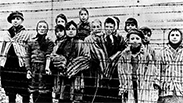
Study: Holocaust trauma can be genetically transmitted
Researchers at Mount Sinai hospital in New York find the same hormonal abnormalities in both Holocaust survivors and their children.
Genetic changes stemming from the trauma suffered by Holocaust survivors could be passed on to their children, a research conducted by a team at New York's Mount Sinai hospital has found.
Researchers said this is the first demonstration of how psychological trauma endured by a person can have intergenerational effects on his offspring.
The research, which was published in the journal Biological Psychiatry, included 32 test subjects, Jewish men and women who were at concentration camps during the Holocaust, witnessed or experienced torture, or had to hide from the Nazis during World War II.
Researchers also examined the genes of 22 of their adult offspring and compared them to Jewish families who did not live in Europe during the Nazis' rule.
Children of Holocaust survivors were found to be three times more likely to develop post-traumatic stress disorder if they were exposed to a traumatic event than demographically similar Jewish people whose parents did not survive the Holocaust.
Researchers found that children of Holocaust survivors had the same neuroendocrine or hormonal abnormalities that the Holocaust survivors and other people suffering from post-traumatic stress disorder had.
It led them to the conclusion that specific risk for certain things, like post-traumatic stress disorder, was associated with having a parent that had post-traumatic stress disorder.
"The gene changes in the children could only be attributed to Holocaust exposure in the parents," Dr. Rachel Yehuda, who led the study, determined.
The research examined "epigenetic inheritance" - a theory asserting that environmental influences like smoking, weight loss and pressure could affect the genes of one's children and even grandchildren.
While the scientific convention is that only genes that are included in one's DNA could transmit biological information from one generation to the next, genes do change based on the environment on a regular basis, through chemical marks that attach themselves onto one's DNA.
Past research showed that some of these chemical marks are passed on to the next generation, which shows that the environment can influence the health of the unborn child.
The Mount Sinai researchers focused their study on a gene associated with the regulation of stress hormones, which is known to be affected by trauma. They found epigenetic marks on the same part of that gene in both the survivors and their children, while a similar correlation was not found among Jewish families who did not live in Europe during World War II.
Speaking about what led her to research children of Holocaust survivors, Dr. Yehuda said that after setting up a clinic for survivors at Mount Sinai hospital, they started receiving phone calls not from the survivors themselves, but from their children.
"What we began to see quite clearly was that offspring were reporting that they had been affected by the Holocaust in many different kinds of ways, but in a very coherent and cohesive pattern," she said.
"They talked about feeling traumatized by witnessing the symptoms of their parents. And they talked about being traumatized by some of the expectations that the Holocaust had placed on them, such as that they are the reason their parents survived and therefore there was a whole set of things that they would now have to accomplish so that all the people that died— they could give their lives meaning. They had difficulty in any kind of a separation circumstance — divorce and those kinds of things. And they described essentially this problem in separating from their parents," Dr. Yehuda went on to say.










